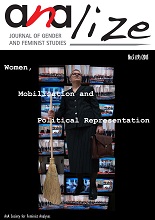Modern States, Legal Reforms and Feminism(s) in Muslim countries
Modern States, Legal Reforms and Feminism(s) in Muslim countries
Author(s): Alina Isac AlakSubject(s): Gender Studies, Islam studies, Family and social welfare, Sociology of Law
Published by: Societatea de Analize Feministe AnA
Keywords: modern state; state reform; Islamic jurisprudence; Islamic feminism; Iran;
Summary/Abstract: The translation of the Qur’anic precepts into concrete laws, meant to answer certain social necessities, was a complex and fallible process. During the past century, the general wave of reconceptualising the equality between women and men was countered in the Islamic space through the diverse reinterpretations of the sacred texts in order to propose alternative Islamic solutions to the traditional patriarchy. At the same time, the Family Code reform was marked by some specific tendencies, common to many Muslim-majority countries: the transition towards the nuclear family, an accent on the rights and the identity of the individual, the development of formal methods for solving conflicts, the codification of law, the advancement of written documentation and the protection of social justice and of women’s legal rights in marriage and in divorce. The first part of this article will be dedicated to a succinct presentation of the family code reformation that was generated by the formation of the modern states in the Middle East. Recently, jurisprudential reforms based on Islamic feminist criticisms are in the centre of Islamic feminist debates, but practically improving the laws that regulate and/or affect Muslim women’s life is a strenuous, long-term process as it involves changing some deeply rooted patriarchal mentalities and challenging the „private”, unequal construction of the marital relations. The negotiation between these feminist groups and the local authorities responsible for the policy and law-making process is rarely a successful one. The new Iranian Civil Code proposed some of the most advanced family laws in the Middle East, classical legal prescriptions being reinterpreted from the current modern conditions perspective. The complex dynamic that generated some specific legal reforms that are beneficial to Muslim women were the result of the theoretical negotiations that involved not only the classical interpretations of Islamic law, the Islamic reformist contemporary theses, but also the recourse to knowledge based on modern sciences, especially on medicine. Iranian Muslim feminists had a significant role in the process of reformation and this will be shortly analysed in the last part of the present article, beside some brief comparisons with the situations specific to other Arab countries.
Journal: AnALize: Revista de studii feministe
- Issue Year: 2015
- Issue No: 5 (19)
- Page Range: 98-109
- Page Count: 12
- Language: English

